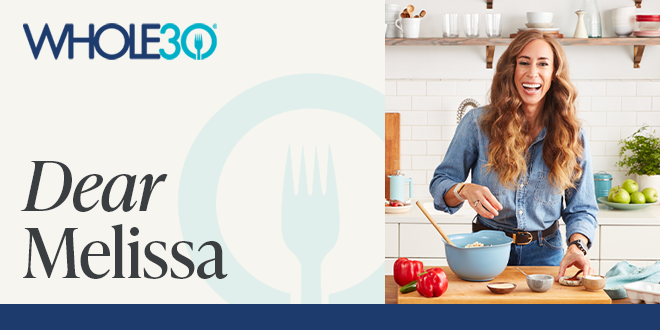Dear Melissa,
Would you say you’re an Abstainer or Moderator by Gretchen Rubin’s standards? (Assuming you’re a Moderator), I wonder if that classification makes your food freedom easier? I’m an Abstainer, and my food freedom doesn’t seem so free. Thanks! -SKHW on Instagram
For background: Gretchen Rubin is both a friend and a best-selling author. In her habit book Better Than Before, she talks about people generally falling into one of two camps when it comes to temptation: Abstainers (who find it easier to give something up entirely than do it just a little) and Moderators (who get panicky at the thought of “never” getting or doing something again). I suspect you already know which camp you fall into, but if you’re not sure, read this article, then come back here.
Dear SKHW,
I’m an Abstainer all the way. Like, if there was a definition of “Abstainer” (other than Gretchen’s), it would just be a picture of me. I’m a recovering drug addict. I’m black or white, on or off… as with many addicts, there are no 50 shades of anything in between.
This will make total sense if you’ve read the Whole30 rules, by the way. Habit research does support the idea of black-or-white rules being easier for the brain to follow, but the program is also written this way because that’s how MY brain, specifically, works.
You’d think us Abstainers would have a hard time with the idea of food freedom, because most people assume that food freedom is moderation. Eat everything you want—just not all at once, or every single day.
If that were a case, I’d be sucking at food freedom. It’s exhausting for me to think about “moderating,” as the concept makes my brain go into overdrive. “What’s ‘a little?’ What’s ‘too much?’ What’s ‘too often?’ If I eat one bite of a cookie every day, is that better or worse than a whole cookie once a week? If I add this cookie to that wine, is that too much? I haven’t eaten any treats all week—does that mean I have no balance?” It. Never. Ends.
The good news is that food freedom has nothing to do with moderation. Which is darn good news for us Abstainers.
Food freedom as an Abstainer
Food freedom isn’t about moderating. It’s about making conscious, deliberate decisions in the moment, and honoring whether it’s worth it and you want it right then and there. Every opportunity to eat or drink something less healthy is a discrete instance; a stand-alone moment in time where you get to decide, “yes” or “no.”
Which makes it sound kind of “black or white,” doesn’t it? Let’s illustrate with a story:
I’m at dinner with friends, and the dessert menu comes around. I look, and the churros are tempting. Right then and there, I run through my Food Freedom checklist: “Do I want it? Is it worth it? Will it mess me up? Am I willing to accept the consequences?” There are only two answers here—yes, it’s worth it and I really want it, or no, it fails one or more of those criteria. Because when it comes to food freedom, a “kinda” or “maybe” or “sort-of” is a NO. (Plus it’s not like you can kinda eat something. You either do or you don’t, even if it’s just one bite.)
Which means if you’re an Abstainer, you can think about every food freedom choice as an “on or off” moment—no “moderation” in sight! Even more important is realizing that each instance is totally independent. You may say yes to the wine tonight, but tomorrow night it’s just not worth it. You may pass on the cupcakes at your friend’s birthday party, but choose to savor one at Sunday brunch. You may order your entire meal gluten-free… then get chocolate cake for dessert. There are no rules, but it’s not “moderation.” It’s conscious, deliberate decision-making in the moment, one hundred percent of the time.
Now, this is just how I think about it, because moderation doesn’t work for me. If you’re an Abstainer, you’ll probably love this approach, and it may open a new doors to vibrant food freedom.
Food freedom as a Moderator
If you’re a Moderator, you may love thinking about your food freedom in terms of “I can have anything I want, any time I want, in moderation with the other healthy things in my diet.” If that’s the case, then go on with your moderating self! You need to make food freedom work for you. If it helps you to think about it in terms of allowing all things in moderation, fantastic.
But your decisions must also be conscious, deliberate, and honor what you really want in the moment.
Let’s revise the prior story: I’m at dinner with friends, and the dessert menu comes around. I look, and the churros are tempting. But I don’t run through my Food Freedom checklist. I don’t ask, “Do I want it? Is it worth it?” Instead, I bypass self-awareness and tell myself, “Everything in moderation!” So I eat one. Or two. And a glass of wine, because moderation!
That is not how I’d want you to “work” your Food Freedom plan. In this story, you’re not in touch with what you really want, and you’re not making a conscious deliberate decision based on what you know is and is not worth it for you. You won’t find lasting food freedom drifting down a river of sweets and treats on a “moderation” floatie. You must commit to honest self-awareness throughout the process. That means reframing your Moderator thought process to, “Everything that’s actually worth it in moderation.”
Food freedom for all
If you’re an Abstainer, there’s a way to think about food freedom in a way that totally works for you. If you’re a Moderator, you can think about it our way, or your own way—it’s your food freedom! Just remember that regardless of your big-picture approach, food freedom only exists when you make conscious, deliberate decisions; honoring what you really want in and what is worth it for you in that moment.
For more on obtaining and sustaining true food freedom, read or listen to my New York Times best-selling book, Food Freedom Forever.
Best in health,
Melissa
Disclaimer: This page contains affiliate links. We earn a small commission when you purchase through these links.
To have helpful Whole30 guidance and advice straight from Melissa Urban and the Whole30 HQ team, sign up for the Whole30 email list. You’ll get a variety of compatible recipes, insightful articles, and much more delivered to your inbox every week.














